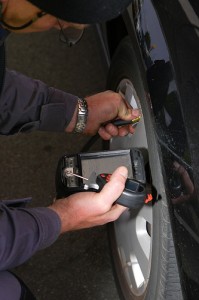 We’ve done out best to bust nitrogen tire inflation myths and other arguments against the practice. Some of these arguments are understandable and logical, but others are just plain wacky. These wacky arguments skew the discussion because some people may believe them, leading them to thinking nitrogen tire inflation is a scam because nitrogen tire dealers and providers are making wild claims about the practice. Not only are dealers and providers not making these claims (we can’t speak for the mechanic or the salesperson, but we assure that those who sell the equipment aren’t making these claims), but these claims are just wrong. Here are a few them that we found and would like to bust right now:
We’ve done out best to bust nitrogen tire inflation myths and other arguments against the practice. Some of these arguments are understandable and logical, but others are just plain wacky. These wacky arguments skew the discussion because some people may believe them, leading them to thinking nitrogen tire inflation is a scam because nitrogen tire dealers and providers are making wild claims about the practice. Not only are dealers and providers not making these claims (we can’t speak for the mechanic or the salesperson, but we assure that those who sell the equipment aren’t making these claims), but these claims are just wrong. Here are a few them that we found and would like to bust right now:
As for moisture, changes in humidity affect tire performance two ways. First, the density of humid air fluctuates more with temperature than that of dry air, so removing humidity can keep your tire pressure more consistent, especially when the temperature climbs over 100 degrees Fahrenheit. That may be a legitimate concern in Formula One racing, but it’s not much of an issue if you’re just tooling around town. – The Straight Dope
The density of humid air has nothing to do with tire performance. Humid air is bad for your tires because it is humid, because the water vapor is very susceptible to temperature changes and causes the tire pressure to fluctuate. This also happens at temperatures below 100 degrees Fahrenheit because as you drive, you heat up the tires, no matter what the temperature is on the outside. They’re moving, there’s friction, and all that creates heat. All this is a concern if you’re just tooling around town, because tooling around town creates heat as well, and the water vapor in your tires is still reacting.
Another claim I’ve seen is that since nitrogen is slightly lighter than air, you’ll save weight and get better performance. However, we’re talking about a weight difference of less than 4 percent of the gas in the tire – in other words, a difference of less than an ounce for most vehicles. – Also The Straight Dope
We have no idea who said this, but the better performance from nitrogen doesn’t come from saving weight. It comes from the fact that nitrogen maintains proper tire pressure for a longer period of time, and its the proper tire pressure that creates better performance and handling.
The argument for using Nitrogen in your car tires is this: Air and Nitrogen would compress at different rates depending on temperature, with air being more squishy than Nitrogen, and that would cause your tires’ pressure to vary more with air than with Nitrogen. – Scienceblogs.com
More squishy? What does that even mean? Just because this argument is coming from a science blog doesn’t meant that it’s scientifically sound.
Proper inflation is the real issue. Under-inflated tires reduce gas mileage. They flatten out, creating more surface area and thus adding friction, which makes the engine work harder. The extra friction, and resulting heat, also increases the chance of a blowout. A properly inflated tire is always safer and more efficient than under-inflated shoes (unless you’re driving across a sand dune). – The Truth about Cars
If only it were this simple. Since air-filled tires are much more susceptible to temperature changes, there are chances for an inaccurate reading when checking the tire pressure of an air-filled tire. For example, if a consumer stops at a gas station after spending some time running errands and driving around, and decides to check their tire pressure, it’s likely that they’ll get a reading that is higher than what the tire pressure really is. The reason is the tires have been heated up from the previous driving,
This could mean that the consumer gets a reading that says their tire pressure is fine, or is too high, and will do nothing about a tire that’s really low or will make it low by releasing pressure to compensate for the high reading. This is why it’s recommended to check tire pressure when the tires a cool, such as before starting the car or after being parked for a few hours. Since tire pressure ought to be checked when the tires are cool, this means that tires would need to be refilled at home with an at-home air compressor (since most people would have to drive to the gas station to get to their air compressor, heating up the tires and ruining the reading).





